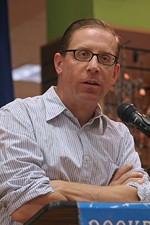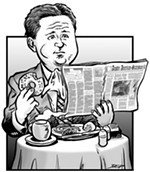Remember the Angle
Familiar Props and Tired Stories at the Alamo
By Chris Walters, Fri., Nov. 8, 1996
Held on the narrow street in front of the old mission that is misleadingly called a plaza, the rally could not have been attended by more than a couple of thousand people. Some of them seemed to recognize their status as extras and left a few minutes after Clinton began talking, apparently signalling that sighting the celebrity-in-chief means a lot more than hearing him speak. The politicians gathered on a platform that was erected just outside the outer perimeter of the Alamo's grounds, leaving several dozen yards between them and the front of the Alamo so that the famous structure would register clearly in the background on camera. The people attending the rally thus had to squeeze into a space between the platform and the multi-tiered camera gallery that could not have been more than 30 or 40 feet wide, and it was packed with the Democratic party faithful whose tiny numbers were belied by standard visual magic -- on the news they registered as a teeming mass -- while the B-list rabble, people who spontaneously showed up, were confined behind low metal fences on either end of the street. Even on the edge of the A-list crowd, where I stood, it was like looking down a tunnel.
Clinton and the media have a compact which is seldom violated: He stays relentlessly on message, and so do they. He talked about "the new politics of common ground" versus "the old politics of division," and got off a couple of good lines about how happy the other side would be if they were running an incumbent president in the current economic climate. "They'd be saying it is morning in America. They'd claim the president could virtually levitate." The humor of this was more or less lost on the crowd, though it would have played beautifully on television had anybody elected to use it.
Having heard it all before, journalists ignore this kind of thing in favor of their horse-race handicapping, which is their standard spiel. The story that ran in the Austin American-Statesman the next day, "Clinton uses Alamo as setting in final Texas campaign," by Ken Herman, was typical. It quoted Clinton three times, on wanting to stand in front of the Alamo "on the last weekend of the last campaign of my entire life," on how the Alamo symbolizes "the transformation of Texas, the transformation of America and the best hope for the future," and his asking "every person from Texas who believes it is the worst economy in 20 years to vote for Senator Dole and every person who knows better to vote for me." The rest of the piece discussed the Democrats' chances for carrying the state, quoting Cisneros, Garry Mauro, Gonzalo Barrientos and Victor Morales, who were on the platform, and George W. Bush, who was not. Local and national television pieces were versions of the same thing.
None of the coverage I saw mentioned Henry B. Gonzalez, the respected congressman from San Antonio who at 80 years of age is the Democratic Party's last living link to the New Deal era in Texas. Gonzalez spoke about the old ideals of the party, recalling a time when the poll tax prevented poor people in Texas from voting. Speaking quietly under the warm autumnal sun -- it was a lovely day -- Gonzalez briefly embodied a past that Clinton and his ilk often seem bent on betraying. Since Gonzalez didn't shout into the microphone à la Ann Richards, Henry Cisneros or Hillary Rodham Clinton, it was almost impossible to hear him at a distance of 50 or 60 feet. This only heightened the poignancy of the moment, and if you knew something about Gonzalez and why his name is a byword for integrity in this part of the country, it was almost unbearable. Finally the crowd virtually ordered him to yield the podium, and the show went on.
Delayed Reaction
The Statesman continues mounting worthwhile investigative efforts, the
latest example being last Sunday's piece by Diana Dworin on the City of
Austin's bungling with its public housing stock, "Public homes for the poor
sitting vacant." It was good stuff -- deserving families on the waiting list
for upwards of a year while good apartments are vacant or occupied by drug
dealers and prostitutes -- the kind of aggressive reporting that makes a local
daily's reputation.It is thus passing strange that a scandal of potentially mammoth proportions has scarcely graced the paper's pages. Early in October a federal jury in New Jersey convicted J. David Smith, the former national sales manager of Gtech, which operates the Texas Lottery along with lotteries in 27 other states and a host of foreign countries, of orchestrating kickbacks to state-level political consultants. Questions arose concerning Smith's financial dealings with Ben Barnes, former Lieutenant Governor of Texas, once the fair-haired boy of state politics and now a powerful lobbyist. It emerged that Barnes' lobbying firm, Entrecorp, makes in the neighborhood of $3 million-plus a year for securing Gtech's lucrative Texas contract and keeping it on track, an incredible 4% commission on Gtech's Texas haul, which exceeded $135 million in 1995.
In early October The Wall Street Journal reported on Smith's conviction and the Barnes connection, followed within a few days by perfunctory coverage in the Statesman. Then, around the 22nd and 23rd of October, the dam broke. California newspapers reported the release of a report from Gtech, whose California contract is worth some $400 million, saying that the state's lottery is among the worst-run in the nation. This was an obvious swipe at California's lottery director, Maryanne Gilliard, who had announced that Gtech's contract in that state would not be renewed. At the same time, a massive investigative piece by Fortune magazine reporters Peter Elkind and Shaifali Puri was published on the Internet, the product of a four-month investigation. "Rare is the company that has faced as many allegations of baldly sleazy conduct as Gtech," they wrote, following that statement with 8,000 words of appalling detail. Among their revelations was the information that a U.S. Attorney in Texas, along with U.S. Attorneys in two other states, are investigating the company.
By the time the Fortune article appeared on newsstands on October 30, the Los Angeles Times had interviewed Gilliard, who said Gtech tried to blackmail her, threatening to release the damning report. Gilliard also recounted recent conversations with other state lottery directors who were "just flat afraid" of the company.
The Statesman was silent. Then, also on October 30, the Dallas Morning News reported that a federal grand jury had issued a subpoena for travel records at the request of U.S. Attorney William Blagg of San Antonio. A co-author of the story was Richard Oppel, Jr., son of the American-Statesman editor-in-chief. The Statesman ran a story one day later, "Lottery Commission turns over subpoenaed travel records," by Ken Herman, which included information about the Smith conviction but omitted any mention of the California context or the Fortune epic.
All of this activity could amount to the opening gusts in a hurricane of BCCI proportions, and Texas is one of the epicenters. No doubt the daily will be all over the story any time now; they certainly have some catching up to do. In the meantime, the Fortune article, "Numbers Crunchers," which appeared in the magazine's November 11 issue can be found on the magazine's website at http://pathfinder.com/fortune
Mouth Almighty
Talk radio host Rollye James lost her job at KLBJ-AM last week after an
ill-advised satirical sortie into the subject of whether Bill and Hillary
Clinton should be shot. (She liked the idea.) An encounter with the FBI,
probably unpleasant, followed. This event, along with KVET commentator Paul
Pryor's latest relapse, was covered by John Herndon in last Thursday's
XL.ent supplement with his usual skill. A hilarious letter from a local
Republican Party hack appeared in the American-Statesman the next day,
asserting that Austin will suffer a "dumbing-down" of media quality should
nobody else in this market give James a job. Really.James liked to carry on at great length about how much she hated it here, so happy trails to her. And remember, friends, being a successful radio demagogue is no cakewalk. It takes talent, skill, and a good working knowledge of those touchy federal laws regarding threats on the life of a sitting president.
Got something to say on the subject? Send a letter to the editor.








